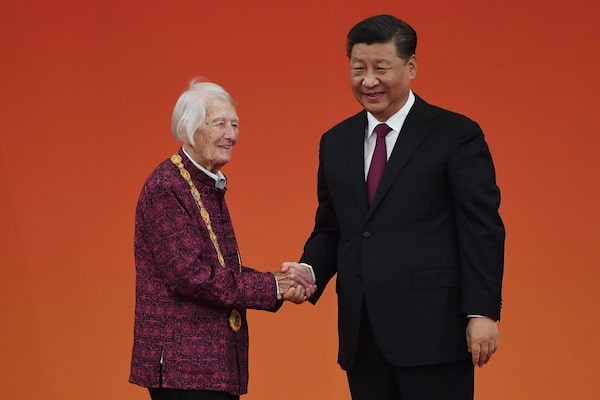
Canadian anthropologist and educator Isabel Crook receives an award from Chinese President Xi Jinping during a ceremony at Beijing's Great Hall of the People in 2019.GREG BAKER/AFP/Getty Images
Canadian educator and anthropologist Isabel Crook, a committed Communist who witnessed the founding of the People’s Republic of China, has died, according to Chinese state media. She was 107.
Ms. Crook, who said seeing Mao Zedong’s troops enter Beijing in 1949 was “the most joyful event I think I’ve ever watched,” experienced both the highs and lows of the “New China.” During the Cultural Revolution, she and her husband were jailed, and were later witnesses to the Tiananmen Square Massacre of June, 1989.
In 2019, Ms. Crook was awarded the Friendship Medal, China’s highest honour for foreigners, by President Xi Jinping, for her work promoting education. Only nine other people have ever received the medal, including Russian President Vladimir Putin and Cuban leader Raúl Castro.
Isabel Brown was born on Dec. 15, 1915, to missionary parents working in Sichuan province, in southwestern China, where she spent most of her childhood. After studying anthropology at the University of Toronto, she returned to China in 1939, even as the country was at war with Japan. There she began her career as an anthropologist, and met her future husband, British journalist and Communist Party member David Crook.
By 1942, Mr. Crook had enlisted in the Royal Air Force, and Ms. Crook followed him to Britain, where she volunteered in a munitions workshop and joined the Canadian Army. After the war, she entered the London School of Economics’ Anthropology Department on a veterans’ grant, and worked alongside leading ethnologist Raymond Firth.
They returned to China in 1947, as civil war between the Communists and Nationalists entered its final stage. This, Ms. Crook wrote later, “marked the beginning of my role as a participant-observer of the Chinese Communist Revolution.” Both Crooks had grand plans – Mr. Crook to write a sequel to Edgar Snow’s 1938 book Red Star Over China, and Ms. Crook to work as anthropologist – but were soon “caught up in the life of New China,” she said.
“David and I were asked to teach English at a newly established Foreign Affairs School, where we would help prepare a few dozen students for future diplomatic service,” Ms. Crook wrote. Originally based in the Communist headquarters of Hebei, the school moved to Beijing with the victorious Red Army in 1949, and Ms. Crook watched the troops entering the capital alongside some of the country’s new leaders.
“We climbed up onto the Qianmen gate. There were a lot of us up there, including Lin Biao, commander of the troops that liberated Beijing, but it didn’t seem in the least strange that a few foreigners mingled among high-ranking officials,” Ms. Crook remembered years later. “We were all wearing the standard-issue military uniforms. When some resident foreigners in the Legation Quarter saw us, they stared in astonishment!”
The school for diplomats the Crooks had helped establish eventually became Beijing Foreign Studies University, where Ms. Crook spent the next 40 years, pioneering English-language instruction in China. While she had not intended to become a teacher, Ms. Crook said she found the work “totally engrossing.”
“During this time I also continued to participate in mass movements as they came along, the most all-consuming of which, the Cultural Revolution, swept through my campus in the summer of 1966,” she wrote in 2013.
Ms. Crook was detained on campus for three years, during which time she said she read and reread the works of Mao Zedong, enjoying his “rare shafts of humour.” Her husband fared less well: Mr. Crook was accused of being a spy and jailed for more than five years, much of it in solitary confinement.
In 1973, the Crooks were rehabilitated by premier Zhou Enlai, who apologized for their “great suffering.” They chose to remain in China, and in 1981, Ms. Crook retired from teaching and resumed work as an anthropologist. She was “invigorated” by an influx of Western-trained sinologists, she wrote later, and the work of a new generation of Chinese sociologists and anthropologists.
The Crooks’ faith in China was shaken again in 1989, with the massacre of protesting students and workers around Tiananmen Square. According to the Guardian, Mr. Crook, in particular, sympathized with the movement and later refused to take part in official events where those responsible for the crackdown would be in attendance. Unlike Lois Snow, wife of Edgar, the Crooks did not publicly break with Beijing, however, and Mr. Crook remained in the country until his death in 2000.
Ms. Crook continued to work after her husband’s passing. In 2013, alongside Yu Xiji, she finally published Prosperity’s Predicament: Identity, Reform, and Resistance in Rural Wartime China, a study of a village in Sichuan. The two women had begun their work in 1940, but, Ms. Crook wrote in the book’s introduction, “before we finished our analysis, circumstances changed dramatically.”
Ms. Crook leaves three sons: Michael, Carl and Paul.